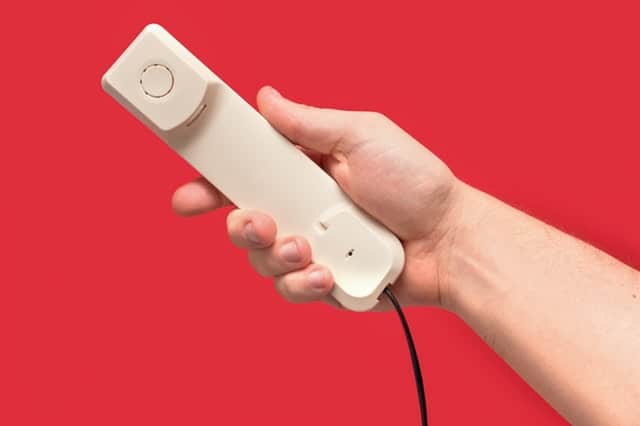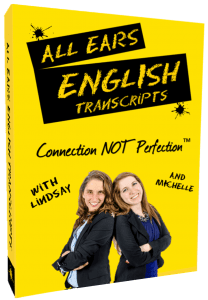
Have you ever heard somebody use a word that was really a sound?
Have you heard somebody use a word such as “crash” in English conversation?
Do you know what an Onomatopoeia is?
Today we’re looking at words that are actually sounds, and the role that they play in native English conversations.
This is a very vivid, dynamic, and fun part of conversation, and you will learn what some of the most common ones are and how to use them.
Get Your Transcripts Today!

Make sure you understand every word you hear on All Ears English.
Bring your English to the advanced level with new vocabulary and natural expressions.
Subscribe and get the transcripts delivered by email.
Learn to speak naturally with the American accent.
Click here to subscribe and save 50%
We have a question about these words and you have likely wondered the same thing yourself.
Hi Lindsay,
I recently started to listen to your podcast, which I found really interesting and useful! I have a question to ask you, and I’m hoping you can help me to answer.
Yesterday I watched a TV show called “Glow Up” on Netflix about competition among several aspiring makeup artists. The judge, Val Garland, loves to say “Ding-Dong! Marvelous!” She says this when she is amazed by an artists’ performance.
The word “ding-dong” sounds like the sound of a doorbell, and I am confused about the meaning of it. I wonder where the word comes from and how I can use it in my daily life?
Thanks a lot for your show and your help,
Mendy
A Fun and Important Aspect of Conversation
As the example above states, ding dong does sound like a doorbell!
So typically you would hear someone may say “ding dong” if someone isn’t paying attention and you want them to.
It’s one of those words that you may hear used as a silly insult too, though that’s not as nice or used as frequently.
But today we are going to focus on the idea of the onomatopoeia!
An onomatopoeia is a word made to illustrate a sound– so ding-dong is an example of this.
It is a way to sound LIKE what you are describing, and you can picture that sound in your mind as you say it.
An onomatopoeia may make you think of poetry or even comics where you see words such as “boom” or “crash” used often.
You will hear a lot of animal sounds in this category such as “moo”, “meow”, “neigh.”
These are great examples because they are made up words to sound like the real thing.
You may not actually know that’s what the animal sounds like, but the word is made up to mimic what they sound like.
We’re going to look at some other great examples, and how and when we use them.
Some Great Examples
You might not realize just how many of these words exist within the English vocabulary.
These are a common part of conversation, and they are fun words to use.
Check out the following words that fall into this category, and you will be happy to see how many you have to choose from.
- Ding-dong: For the best effect, say this in a sing song way. You can almost hear the sound in this word when you say it, especially in a sing song way. This can also be used to talk about somebody that isn’t that smart, but that’s not a nice use of it.
- Crash: This is a word you can hear, but it can be used in multiple ways. It can be used to talk about staying at somebody’s house. It can also be used to describe a sound, or when two cars get into an accident.
- Knock knock: You may use this to talk about a joke, like a ” knock knock joke.” You can hear somebody knocking and it comes up in conversation quite a bit.
- Beep beep: You may hear this in the song “Wheels on the Bus” that is often played for kids as an example.
- Ring ring: You might use this when you are playing with a pretend phone with a kid. You could pick up the phone and say “ring ring.”
- Buzz: This is used frequently just like crash is, and so you will hear it quite a bit. In addition to using it to describe the actual sound, you can also use it to talk about a bee as they are moving around you. You may say this about a phone that is on vibrate mode. You can use it to talk about people who are talking about something big.
- Hiccups: This is a common term and you can hear the sound that it makes in the name. You will hear people talk about their hiccups in conversation a lot. You may even talk about a cure for the hiccups as they can be frustrating to deal with.
- Tick tock: You may say this to somebody if they are taking a long time to get ready and you’re impatient waiting for them. It is used in kids songs. There is even a popular app called tick tock though it’s spelled differently.
These are all great examples, and they are words you will hear frequently.
Having Fun While Taking Learning To The Next Level
It’s a really fun thing to think about because just the sound of a word can be such a great depiction of what you are trying to say.
Some words are obviously onomatopoeias but some aren’t quite as obvious, they may be more subtle.
For example, animal sounds are obvious, and you can almost hear the animal making the sound as you say it aloud.
Something like “slap” is so ingrained as a regular word that it’s hard to think of it as being a sound.
This is true for some of the words you looked at above such as “crash” because it’s a common word used in conversation often.
When you really look at it, onomatopoeias are unlike any other aspect of English.
They are a fun addition and they add a really creative twist to the conversation.
When you can use a word that allows you to almost hear the sound aloud, then you know that you are moving to a more advanced level of English.
These are the types of words and aspects of vocabulary that can really take you to the next level.
These can be a fun addition to your conversations, and can also help you to become an even stronger English speaker.
Challenged yourself to use onomatopoeias in conversation, and see how much fun you have with this!
Takeaway
Try to use some of these in conversation, and see how they can take things to another level.
These are great words and make for a fun way to connect!
Are there others that you can think of?
You might be surprised at how many of these words exist, and they are fun because you can hear the word as you say them.
This is a great example of a fun word to use in English, and these can be a helpful addition to your conversations.
If you have any questions please leave them below in the comments section.
We’ll get back to you as soon as we can.








